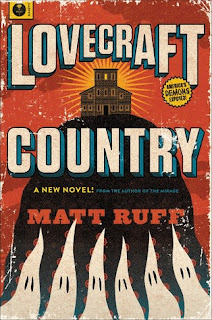Lovecraft Country
Though H.P. Lovecraft is in the title of Matt Ruff's Lovecraft Country, it's not a pastiche of his work--there are no elder gods or squishy creatures from the sea. In fact, the only mention he gets in the book is a reference to his racism. That may be the joke here, because this is a horror/sci-fi novel that is centered around the real life terror that African Americans have gone through for centuries.
The book is really a series of connected short stories. When I read an interview with Ruff in the back of the book he said the idea began as a TV series, and then it made sense, as each chapter is a separate story, though involving characters that appear in the other stories. The throughline is that the characters are black and suffer the indignities of life for black people in the 1950s.
The main characters are Atticus Turner and his father, Montrose, and uncle, George. Atticus was a soldier in the Korean War, and at the beginning of the book drives up to Chicago because he feels his father is in trouble. He and George, who publishes a guide for Negro motorists (much like the Green Book) go off to a strange town in Massachusetts, where they find Montrose held prisoner by a group of sorcerers calling themselves the Order of the Ancient Dawn. One of the men, Caleb Braithwaite, will figure in the rest of the novel, as Atticus is found to be the last remaining direct ancestor of the founder.
It all gets very complicated, especially when each chapter follows a different character. One is about a haunted house, another has a woman going to another planet, and yet another has a young boy dealing with a devil doll. What permeates everything is racism. Montrose, we find out, witnessed the Tulsa riots of 1921. A biracial couple are murdered by white thugs. A black woman magically finds herself transformed into a white woman, and discovers how life is on the other side.
While there are moments of brilliance here, I found the structure problematic. I had to adjust with each new chapter, and often forgot who everyone was and how they connected to each other. Also, the conclusion seemed rush, and often something is accomplished by saying magic words, which seems like a cop out.
What the book does do is recognize that there are many black fans of pulp fiction, and those who wrote it, too. I wouldn't be surprised if Jordan Peele gets his hand on this.
The book is really a series of connected short stories. When I read an interview with Ruff in the back of the book he said the idea began as a TV series, and then it made sense, as each chapter is a separate story, though involving characters that appear in the other stories. The throughline is that the characters are black and suffer the indignities of life for black people in the 1950s.
The main characters are Atticus Turner and his father, Montrose, and uncle, George. Atticus was a soldier in the Korean War, and at the beginning of the book drives up to Chicago because he feels his father is in trouble. He and George, who publishes a guide for Negro motorists (much like the Green Book) go off to a strange town in Massachusetts, where they find Montrose held prisoner by a group of sorcerers calling themselves the Order of the Ancient Dawn. One of the men, Caleb Braithwaite, will figure in the rest of the novel, as Atticus is found to be the last remaining direct ancestor of the founder.
It all gets very complicated, especially when each chapter follows a different character. One is about a haunted house, another has a woman going to another planet, and yet another has a young boy dealing with a devil doll. What permeates everything is racism. Montrose, we find out, witnessed the Tulsa riots of 1921. A biracial couple are murdered by white thugs. A black woman magically finds herself transformed into a white woman, and discovers how life is on the other side.
While there are moments of brilliance here, I found the structure problematic. I had to adjust with each new chapter, and often forgot who everyone was and how they connected to each other. Also, the conclusion seemed rush, and often something is accomplished by saying magic words, which seems like a cop out.
What the book does do is recognize that there are many black fans of pulp fiction, and those who wrote it, too. I wouldn't be surprised if Jordan Peele gets his hand on this.



Comments
Post a Comment